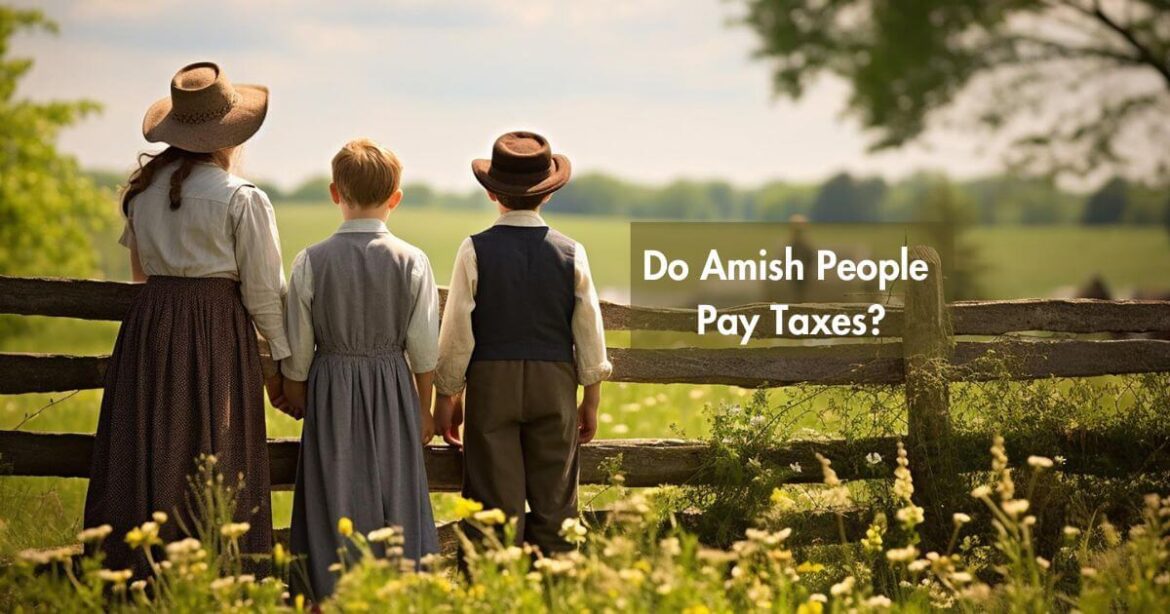The Amish community is often associated with a simple and traditional lifestyle free from the influences of the modern world. They are known for their unique customs, beliefs, and practices that have been passed down from generation to generation.
Many of these reasons raise a common question about the Amish, “Do Amish people pay taxes?” And the common misconception among many is that they don’t.
However, this belief is not entirely accurate because the Amish contribute to local, state, and federal taxes like other American citizens. In this article, I will discuss the topic of Amish and taxes in detail to understand how they contribute to society through taxation.

Read More: Do Churches Pay Property Tax? Discover Everything
Types Of Taxes That Apply To The Amish: Amish Tax Exemptions And Misconceptions
There is a common misconception that the Amish do not pay any taxes at all. However, this is far from the truth. While they may have certain exemptions, Amish communities still contribute to their local economies through taxes.
The Amish are exempt from a few specific taxes due to their beliefs and practices.
For example, they do not pay Social Security or Medicare tax as they believe in taking care of their own elderly and sick within their community rather than relying on government assistance. They also do not have to pay for automobile registration fees or participate in compulsory military service.
Contributing Through Income Taxes
The Amish communities pay both federal and state income taxes. Their income is derived from various means such as farming, selling handmade products, or through successful businesses within their communities.
Despite the stereotype that the Amish are simple people with no source of income, many Amish families are business owners who contribute to their local economies.
The Burden Of Property Taxes
Property taxes are one of the biggest tax burdens for Amish communities. As they typically own large amounts of land for farming purposes, these taxes can be quite substantial. This not only applies to land used for farming but also funds public services such as schools and libraries within the community.
The discrepancy between income and property taxes can be a struggle for many Amish families who may not make a lot of money from their land but still have to pay high property taxes.
This can be seen as a disadvantage for the Amish way of life, where their land is primarily used to provide for their families and not for monetary gain.
Navigating Sales Taxes
Sales taxes apply to any goods purchased by the Amish, including items sold within their community or outside of it. While they may be exempt from certain sales taxes due to their self-sufficient lifestyle, they still have to pay when purchasing goods from establishments or stores outside of their community.
This means that even though they may not contribute much in terms of sales tax revenue, they still abide by the law and pay applicable taxes when required.
Types Of Taxes From Which The Amish People Are Exempt
Social Security Exemption
One of the key exemptions that the Amish have from taxes is in regards to social security. Due to their self-sustaining lifestyle and communal living, the Amish do not participate in government-run social security programs.
This is because they believe it goes against their belief in relying on themselves and their community for support, rather than depending on outside sources such as the government.
Furthermore, even if an Amish individual works for a non-Amish employer, they are still exempt from paying social security tax. This is a unique exemption that sets them apart from other religious groups who may be required to pay this tax regardless of their beliefs.
Voting And Political Involvement
Another aspect of the Amish lifestyle that sets them apart from mainstream society is their detachment from politics. While they may have Amish social security numbers and some individuals may choose to vote, the community as a whole does not involve itself in political matters.
This can be seen as a form of exemption from any political taxes or obligations that may apply to other citizens. The Amish value their separation from modern society and see involvement in politics as a potential threat to maintaining their traditional way of life.
Gas Tax Exemption
Due to their reliance on horse-drawn buggies and limited use of machinery, the Amish are also exempt from paying gas taxes. This is because they do not consume large amounts of gasoline as the rest of modern society does.
Their commitment to living a simple and sustainable lifestyle not only aligns with their religious beliefs, but also grants them an exemption from a tax that many others may consider to be a burden.
Sin Tax Exemption
Finally, the Amish also do not pay what is known as a “sin” tax on items and services that are deemed morally questionable. This can include items like alcohol, tobacco, and gambling.
As part of their religious beliefs, the Amish abstain from these activities and therefore do not participate in contributing to taxes related to them.
While this may put a strain on their interactions with mainstream society, it reinforces their commitment to living a pious and virtuous lifestyle according to their faith.
Do Amish People Benefit From Paying Taxes?

It’s a common misconception that the Amish do not benefit from paying taxes since their way of life is so different from the modern world. However, this is not entirely true.
While Amish individuals and families may not benefit from government-funded programs or infrastructure like roads and public transportation, they do benefit from things like police and fire protection. They also contribute to the overall economy through their businesses and purchases.
Furthermore, many Amish communities have negotiated with local governments to waive certain taxes in exchange for providing services within their own community, such as maintaining their own roads.
Read More: How Many Years Can You File Back Taxes?
Do Amish People Pay Taxes? FAQs
Q: Amish don’t have to pay taxes, is it true?
A: No, this is a misconception. Amish communities are subject to the same tax laws as every other American citizen. However, they may receive some exemptions or deductions based on their religious beliefs and way of life.
Q: Why don’t the Amish pay taxes?
A: The main reason for the tax exemption of the Amish is rooted in their religious beliefs and practices.
The Amish believe in living a plain and humble lifestyle, with a focus on self-sufficiency and community support rather than dependency on government aid or services.
This belief system extends to their aversion to modern technology and the use of electricity, which also means they do not benefit from government-funded infrastructure such as roads and public utilities.
As a result, the Amish see paying taxes as going against their core values and principles.
Q: Do Amish pay property taxes?
A: Yes, Amish communities do pay property taxes. However, they may be eligible for certain exemptions or reductions based on their lifestyle and religious beliefs.
The exact tax laws vary by state and municipality, but in general, the Amish are subject to the same property tax rates as other residents in their area. This means that they must pay taxes on any land or buildings they own, including farms and businesses.
Q: Do Amish people use technology?
A: Yes, but it varies from community to community and individual to individual. Some Amish may use certain types of technology such as phones or tractors, while others may strictly adhere to traditional ways of living without any modern technology.
Q: Do Amish believe in education?
A: Yes, education is highly valued in Amish communities. However, they place a strong emphasis on practical skills and hands-on learning rather than traditional academic education.
Q: How do Amish make money?
A: The Amish community is widely recognized for their hard work and entrepreneurial spirit. They earn their living through various business ventures such as carpentry, construction, retail shops, and restaurants.
Their skills in farming are also well-known, but they also offer other services like lodging and furniture-making which contribute to their diverse sources of income.
Q: Do Amish people pay taxes in Canada?
A: Yes, Amish people in Canada do pay taxes. Despite their simple and traditional way of life, they are still required to pay all types of taxes like any other Canadian citizen. This includes income tax, property tax, sales tax, estate tax, corporate tax, and even school taxes.
The Amish community values honesty and responsibility, which is reflected in their willingness to contribute to the country’s economy through paying taxes.
Q: Are Amish US citizens?
A: Yes, Amish people are US citizens. They are eligible for all the same rights and privileges as any other American citizen. Amish communities have been in the United States since the early 18th century and they are a recognized religious group by the federal government.
As such, Amish individuals are granted the same legal protections and freedoms as other religious groups in America.
Read More: Does Section 8 Look At Tax Returns? What You Need To Know
Do Amish People Pay Taxes? Conclusion
Despite some exemptions and misconceptions, the Amish understand the importance of paying taxes and contributing to their local economies. They may have a different way of life compared to mainstream society, but they still recognize the value and necessity of taxation.
By abiding by tax laws and regulations, the Amish show their commitment to being law-abiding citizens who are willing to contribute to their communities in any way they can.
So while it is true that the Amish do not participate in certain taxes due to their beliefs, they still fulfill their civic duty by paying all applicable taxes and supporting their local economies through business ownership and manual labor.
Reference:
- https://www.ohiosamishcountry.com/articles/amish-faqs
- https://www.scaringilaw.com/blog/2019/february/do-the-amish-pay-taxes-/
